Patricia C. Wrede
Books: Fantasy | YA
Matter of Magic (2010): Mairelon the Magician (1991) and The Magician's Ward (1997)
Kate & Cecelia: Sorcery & Cecelia -OR- The Enchanted Chocolate Pot (1988), The Grand Tour (2004), The Mislaid Magician or Ten Years After (2006) (with Carol Stevermer)
Frontier Magic: Thirteenth Child (2009), Across the Great Barrier (2011), The Far West (2012)
Black Thorn, White Rose: A Modern Book of Adult Fairytales (1994)
Sorcery & Cecelia -OR- The Enchanted Chocolate Pot (1988) with Caroline Stevermer
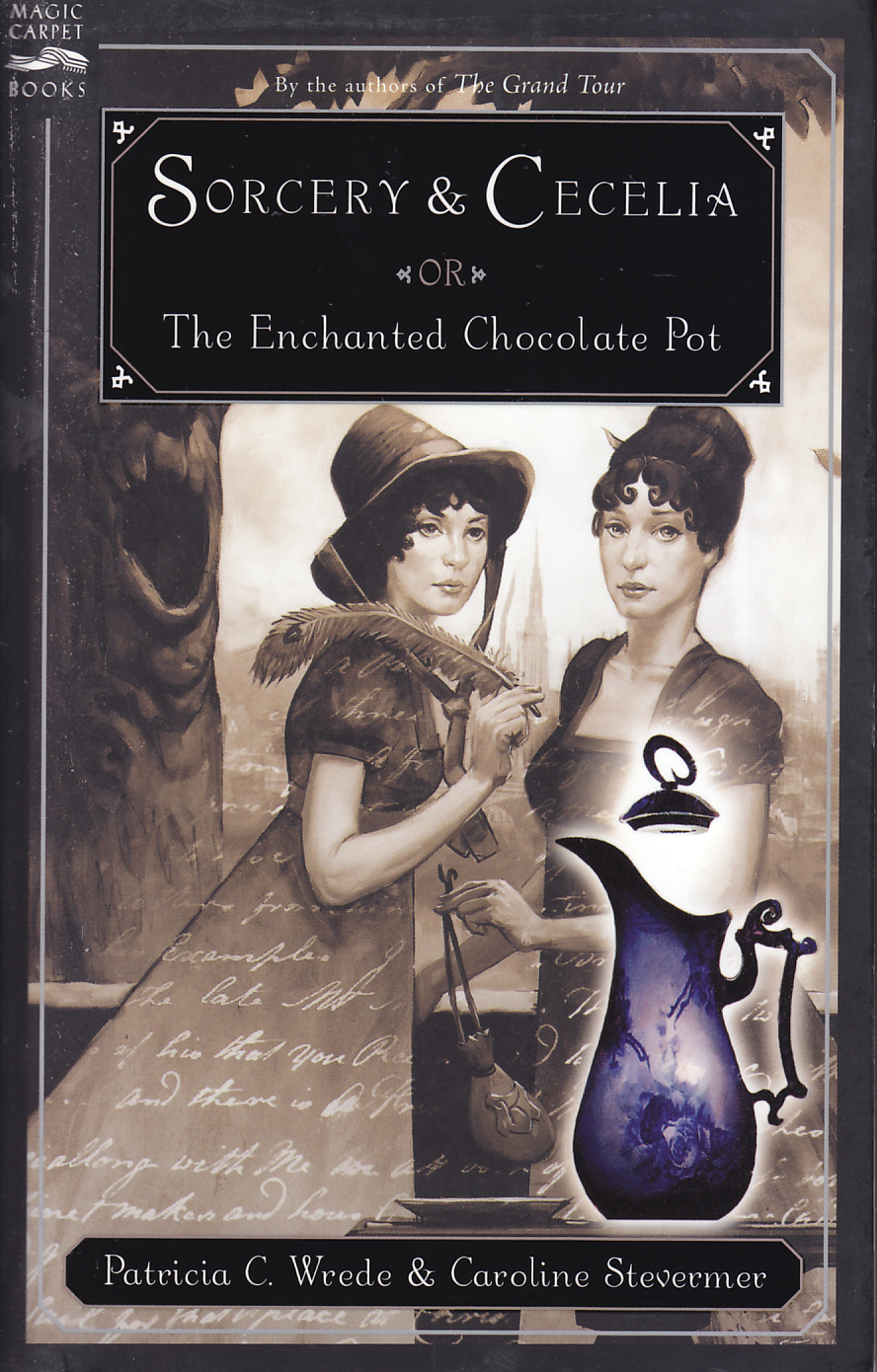 After putting down a book that looked promising but I found only annoying after the first several chapters, I picked up Sorcery & Cecelia,
which I'd put on my wish list because I thought it looked interesting. I
thought that I'd just read a couple of chapters before going to sleep,
however at midnight I found myself thinking, "just one more chapter and
then I'll go to sleep" until I'd read half the book.
After putting down a book that looked promising but I found only annoying after the first several chapters, I picked up Sorcery & Cecelia,
which I'd put on my wish list because I thought it looked interesting. I
thought that I'd just read a couple of chapters before going to sleep,
however at midnight I found myself thinking, "just one more chapter and
then I'll go to sleep" until I'd read half the book.
Sorcery & Cecelia -OR- The Enchanted Chocolate Pot is set in Victorian England and is told as a series of letters between Kate and Cecelia. Kate has gone to London for her first Season, while Cecelia remains in Essex. The twist is that this England is a place where magic is commonplace, and the two girls become involved in a magical plot, which makes Kate's coming out unusually exciting.
First and foremost, this book is a lot of fun to read. It's a relatively quick read, it's quite lighthearted (no angsty teens here), and the story is fascinating. Which is why I had trouble putting the book down to go to sleep.
Cecy, you know I can tell falsehoods. No matter who looks at me, for how long, I can tell bouncers so enormous even Aunt Charlotte does not think to question them.
Although some things were expected--this is a book about teenage girls, after all, there must be some romance--there was plenty that was unexpected. I also liked the fact that the story was told from the point of view of only two characters, so things were happening elsewhere, however we can only assume how they are resolved, because we know no more than the letter writers. Thus the story leaves much for us to figure out and guess on our own.
And did I mention that the story is simply a lot of fun to read?
The only problem I had was with the cover--for the most part I liked the cover, except that the face of the two girls are too old. Everything else is perfect, but it looks like the faces of two women on the body of two teens, although I can't quite place my finger on what precisely it is that makes me feel that way. The rest of the cover, however, I really liked, from the handwriting that overlays the lower portion of the cover, to the blue chocolate pot in the corner.
Additionally, although there is a sequel, this story is complete in and of itself, so if you're looking for a single book to read, this is a good place to sit down and curl up.
Cover by Scott M. Fischer
Published by Open Road Media Teen & Tween
- December 2005 | Rating: 9/10
- January 2015 | Rating: 10/10
- June 2023 | Rating: 8/10
The Grand Tour: or the Purloined Coronation Regalia (2004) with Caroline Stevermer
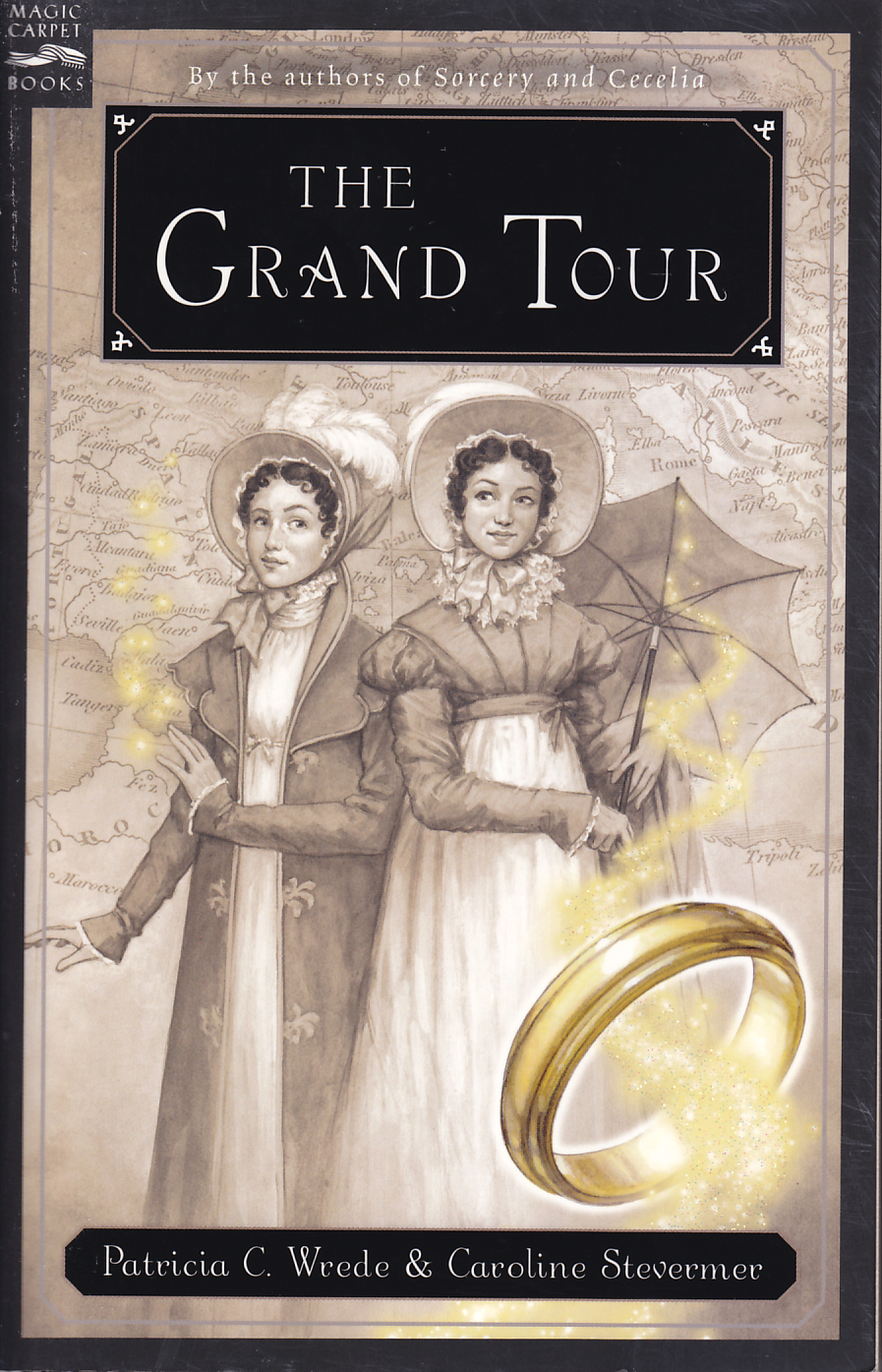 If you've already read Sorcery and Cecelia, then you'll need little or no encouragement to pick up The Grand Tour.
Cousins Kate and Cecelia are taking the grand tour of Europe on their
honeymoons. Within almost no time, they are caught up in intrigue
involving ancient magical artifacts, and a secret group that was active
during Napoleon's reign as Emperor of France.
If you've already read Sorcery and Cecelia, then you'll need little or no encouragement to pick up The Grand Tour.
Cousins Kate and Cecelia are taking the grand tour of Europe on their
honeymoons. Within almost no time, they are caught up in intrigue
involving ancient magical artifacts, and a secret group that was active
during Napoleon's reign as Emperor of France.
"Don't fret," Thomas told him, in what I thought was a most unfeeling tone. "Nobody ever dies of seasickness; they only wish they would."
Ceci's father has of course given them lots of ancient ruins and monuments to see while they are on their tour.
Ask C. to check Uncle's handwriting before I write home with description. He would be upset if I got name wrong and Minerva Anthrax seems most unlikely.
Almost as soon as they land in France, strange incidents seem to occur, which draw the two couples (and the dowager Lady) into intrigue and mystery.
Though they do also get to see plenty of antiquities.
I had never before seen quite so many entirely unsuitable antiquities in one place. Their existence in such numbers gives one a very odd impression of the ancients, if one stops to think.
Because the cousins are together, they obviously can't write letters back and forth, so instead we have parts of Cecelia's deposition to the Ministry of Magic, War Office, and Foreign Office and entries from Kate's commonplace book (i.e. journal).
Like Sorcery and Cecelia, this book is probably not for everyone. The main characters are two young women, just married, on their honeymoon trips. So there's shopping, and dressmaking, and talk of gloves, and Society. But there is also magic and danger, as the two couples unravel the mystery of missing ancient artifacts.
This book, although good, wasn't quite as fun as Sorcery and Cecelia. Although it was fun to see the cousins together, and the trouble they could cause together, as opposed to separately, something about this book just wasn't quite as sharp, quite as fun, as the first book.
Additionally, for the first several chapters, I had difficulty keeping Thomas and James straight. Kate and Cecilia were easy to tell apart, but at times Thomas and James seemed almost interchangeable, and I kept forgetting who was married to whom.
But it was still a good book. Kate and Cecelia are enjoyable characters, and they are good at using their wits to get themselves out of situations, so it's a nice change from the hack and slash I've been reading a good deal of recently.
And again, another excellent cover. The layout is reminiscent of the paperback version of Sorcery and Cecelia, however, the two women on the front look of a more appropriate age this time.
Additionally, the honeymoon portion of this book is extremely understated, so the story is appropriate for any child brave enough to pick up an inch and a half thick book.
If you have not read Sorcery and Cecelia, you should be able to read this book without difficulty. Events of importance are mentioned and explained. However, Sorcery and Cecelia is, in my opinion, the better book, so you might want to start there, and then read The Grand Tour as a fix for needing more proper Victorian fantasy.
Cover by Tristan Elwell
Published by Open Road Media Teen & Tween
- March 2006 | Rating: 7/10
- January 2015 | Rating: 7/10
- June 2023 | Rating: 8/10
The Mislaid Magician or Ten Years After (2006) with Caroline Stevermer
 Kate and Cecy are once again embroiled in magical mysteries.
Kate and Cecy are once again embroiled in magical mysteries.
James is called to investigate the disappearance of a magician who was inspecting the rail lines up north. Thomas and Kate thus get to care for James and Cecy's brood, and soon have their own adventures (of course).
In this story, James and Ceci are sent off by the Duke of Wellington to search for a missing magician–one who was sent to look into the newfangled steam engine trains, while Kate and Thomas watch their children.
(A)fter the first half dozen, one child more or less makes little difference to the general chaos, disorder, and stickiness of life.
And Georgy has taken up residence with Kate and Thomas as well, hiding from what, she won't say, but she hasn't changed any in ten years.
P.P.S. Georgy is composing a letter of apology to you and James. She (belatedly but sincerely) regrets exposing your children to risk. From the amount of time she devotes to this missive, I fear it will be extremely long. It may even be in verse. I thought you should be warned. —K.
As with the first book, the story is told in letters between Kate and Cecy as well as the occasional letter between James and Thomas. And as with the first book, I love the way the story unfolds.
If you have read the first two books, you'll enjoy this one. You should also be able to read Ten Years after without having read the first two books, but I don't know why you'd want to.
Cover by Tristan Elwell
Published by Open Road Media Teen & Tween
- November 2011 | Rating: 8/10
- January 2015 | Rating: 7/10
- June 2023 | Rating: 8/10
A Matter of Magic (2010)
Mairelon the Magician (1991) and The Magician's Ward (1997)
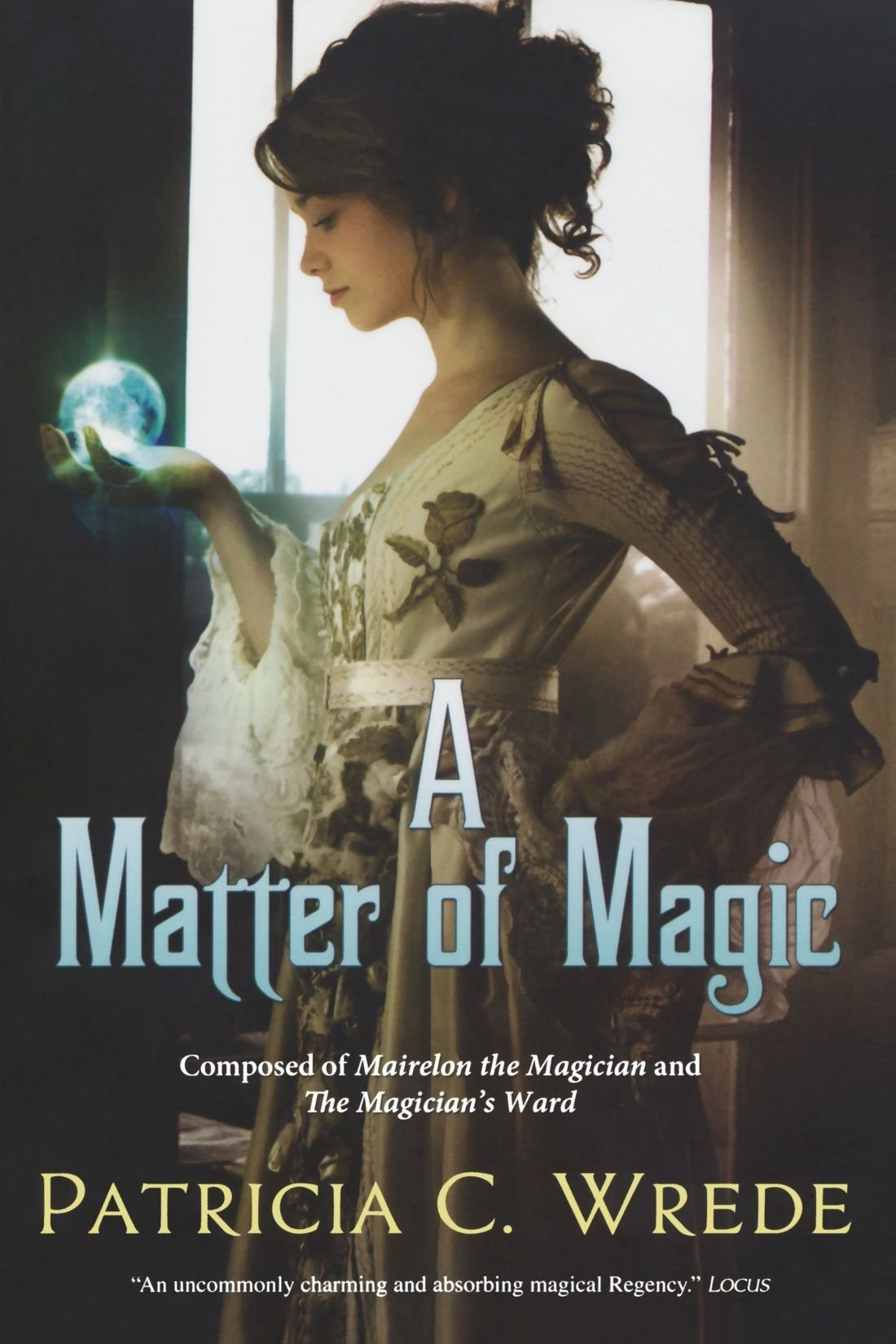 This is a reissue of two lovely YA novels, Mairelon the Magician and The Magician's Ward.
This is a reissue of two lovely YA novels, Mairelon the Magician and The Magician's Ward.
Kim has been living on the streets, hiding the fact she's a girl, and living by her wits as best she can. When she is offered a small fortune to check out the wagon of a traveling magician, the possibility of having enough to get her off the streets is more she can resist.
She was cold, tired, and very hungry, but she did not mention it. She was, after all, used to being cold, tired, and hungry.
But it turns out the Mairelon is more than a performer–he's a true magician, and Kim is in for entirely more than she could even imagine.
(T)hey're mixing magic at random, from the sound of it. Half of it's Welsh, half of it's Scottish, and half of it's cribbed from someone's classical education, with a few things that are entirely out of someone's imagination thrown in for good measure. They'll never get anywhere if that's the tack they're taking."
"That's too many halves," Kim said, frowning.
"It's not a matter of how people are, Kim; it has to do with how they ought to be."
But Mairelon is right, thought Kim as she followed them out to the carriage. It is a costume, and I am only playing a part, the same way I played the part of a boy for so long. The thought was depressing; it made her wonder whether she would have to play at being something other than what she was for all her life.
But what I like best is Kim's attitude and her utter failure to treat Mairelon with much in the way of fear–or even respect.
"Don't fret," he breathed into her ear, his lips barely moving. "Sorry, Kim," he added in a louder tone as he straightened and resumed his seat.
Kim forgot her worries long enough to glare at him. "Don't fret" was probably his idea of a reassuring message, but he couldn't have picked a more ridiculous thing to say if he'd thought about it since the day they met.
One of the things I particularly love about historical fantasy is that it can take the bits it likes about historical periods, but doesn't have to worry much about the more problematic parts of that history. So one doesn't have to worry whether it's accurate or not, because it doesn't matter. History never happened like that.
These two books were just the romp I needed to take my mind off things while I sat in the hospital with my grandmother. An historical romance with magic and mystery–just what I needed.
One of the things I liked was Kim's progression and education through the series. As she spends time with Mairelon he teaches her to speak properly, yet she regresses to her thieves cant when under stress, and you can almost hear how no matter how hard she tries, she'll always sound like she came from the streets. I like that's she's smart, but she's not such a prodigy that she leaves her past completely behind. It's a fine line–showing how she's improved and educated herself, without losing the heart of who she is.
The romance doesn't come until the second book, but it's very well done, as Kim is presented to society (as is her right as a magician) and has to deal with the prejudice against her background and history. And of course the mystery.
If you're looking for a lovely romp and escape, this is the prefect book for young adults or regular adults.
Cover by Larry Rostant
Published by Orb Books
- April 2011 | Rating: 8.5/10
- October 2015 | Rating: 8.5/10
- July 2016 | Rating: 10/10
- January 2023 | Rating 9/10
- June 2023 | Rating 9/10
Thirteenth Child (2009)
 This story is set in an alternate US (North Columbia) in the mid-1800s.
This story is set in an alternate US (North Columbia) in the mid-1800s.
I discovered Patricia C. Wrede's writing when I couldn't resist the title, Sorcery & Cecelia -OR- The Enchanted Chocolate Pot. I also read and enjoyed A Matter of Magic. Both are alternate histories where magic is an integral part of the world, however, in Thirteenth Child they live in the new world this is similar to–but not the same as–the United States.
Eff's twin brother Lan is a seventh son of a seventh son, and a natural magician.
"Wow," Dick said, looking after Papa and Lan. He looked back at me. "Does that mean you're a natural, too? Because you're his twin?"
I stared at him. "I don't know," I said after a minute. "Nobody's ever said."
"Maybe they don't know," Dick said, looking back toward the dwindling crowd. "They like to pretend they know everything there is to know about magic, but they don't really, or why would they always be talking about research?"
But Eff is a thirteenth child, and for the first several years of her life was not just picked on by her cousins, but told by some of her aunts and uncles that she should have been drowned at birth (hence, the attitude of some of her cousins), but things change for her when the family moves out West, just to the east of the Great Barrier, at the edge of civilized lands, beyond which are wild and dangerous creatures, both magical and mundane.
"I heard there are great beasts, the size of a house, that can stamp you flat as paper!" Cousin Bernie said.
"Those are mammoths," Robbie told him. He'd been doing extra reading on the North Plains ever since he found out we'd be living there, and he enjoyed showing off his new knowledge to the rest of us. "They used to be all over North Columbia, but when the first settlers came from the Old Continent, they killed all the ones in the East.
The world building is particularly fascinating. "Historical" events are familiar enough that you can recognize them from American history, but yet different, because of magic that exists in the world.
(T)he Columbian Presidents past the first five—George Washington, John Adams, Thomas Jefferson, Eduard Baier, and Herman Augustus Morton.
It helps that the story begins when Eff is quite young. That makes the world building slightly easier, as (to some degree) we learn about the world as Eff and Lan do. There is still much about the world that is sometimes unclear and hard to understand, but it doesn't do much in the way of harm to the story.
This is an alternate history, set just after the end of the Succession War (Civil War). Civilization has stretched west across North Columbia (north America) to the Mammoth (Mississippi) river, where the Great Barrier spell, created by Franklin and Jefferson, keeps the most dangerous magical creatures from crossing east (and the river itself keeps the non-magical creatures out).
There was slavery prior to the Succession War, but there are no Native Americans. Apparently some people have complained about this, but considering how danger Columbia is, it seems likely that humans would have had a difficult time surviving without strong magics.
And the world building is marvelous. Everything is based upon our world, but without a grounding in history, you might not recognize all the parallels at first.
Of course, for kids, even though there is magic, some things never change.
"Time and practice, time and practice," Alexei grumbled. "Isn't there anything magical we can just do?"
"Sure," Kristen said. "You can mess up."
(W)hen things did go wrong it could be pretty spectacular. Once when a spell went wrong, it punched a hole the shape of a duck in every pane of glass in every west-facing window in every building for three blocks around the magic lab, in spite of all the shields and mufflers they had up.
I also like that instead of Luddites, there are Rationalists, who refuse to use magic, even against magical creatures.
The ending makes it quite clear that there will be another book. And although all the main story arcs are completed, I didn't particularly love the way the story ended. It wasn't a huge thing, but it felt a little abrupt and a lot a tease for the next book coming.
Eff is a complex and complicated character–she is told by her extended family that she is bad like–evil even–and takes that into her head. Luckily, her immediate family loves her, and try to convince her this isn't true. But Eff's story reminds us that the negative things we were told about ourselves take hold and are very difficult to root out later.
But it is of course more than that.
I hardly knew my oldest brothers and sisters. Frank had been away at university since the year I was born. Sharl and Julie had both gotten married before I was two, and Peter had gone off East to school in the same year. Diane had moved out the year before, to keep the books for a candy-making business one of Papa's friends owned. Even Charlie, who was going off to university in the fall, was older enough that I didn't see him much. They felt more like strange grown-ups I had to be polite to than like family.
This passage has always stuck in my mind. My grandmother's youngest sister, and her oldest brother's first child were only a year apart. Cousin Margie always called my grandmother Aunt Lil, but called Grandmom's youngest sister Doris.
It's one of the things that I don't think we consider in a modern world. That all those large families of the late 19th and early 20th century would have been nothing like our current families, and unlike in ways we'd never consider.
It seemed wrong to me that all the doctors and magicians should put so much work into trying to keep me alive, when if they'd known I was a thirteenth child and bound to turn evil in a few years, they wouldn't have lifted a finger.
That's terribly disheartening, but also precisely what happens if we aren't careful.
What is awesome is that it is all about natural history and learning about the world and science. Half the continent is unknown, and what many people want most is to learn more about that world.
"You can mail me your notes whenever it's convenient," Professor Jeffries assured him.
A month later, a tatty-looking packet arrived for Professor Jeffries, containing ten pages that looked like they'd been crumpled up, sat on, and maybe used to strain coffee. … "June third, eight miles north from Klein settlement. Red fox and three kits at watering hole. Deer mice tracks. Iceweed at water's edge; haven't seen this far south before. Looks spindly."
Science and discovery take time and work and mistakes, and this book does a wonderful job showing that, while building an amazing and fascinating world.
Cover by Christopher Stengel
Published by Scholastic
- October 2011 | Rating: 7/10
- March 2016 | Rating: 9/10
- November 2017 | Rating: 9/10
Across the Great Barrier (2011)
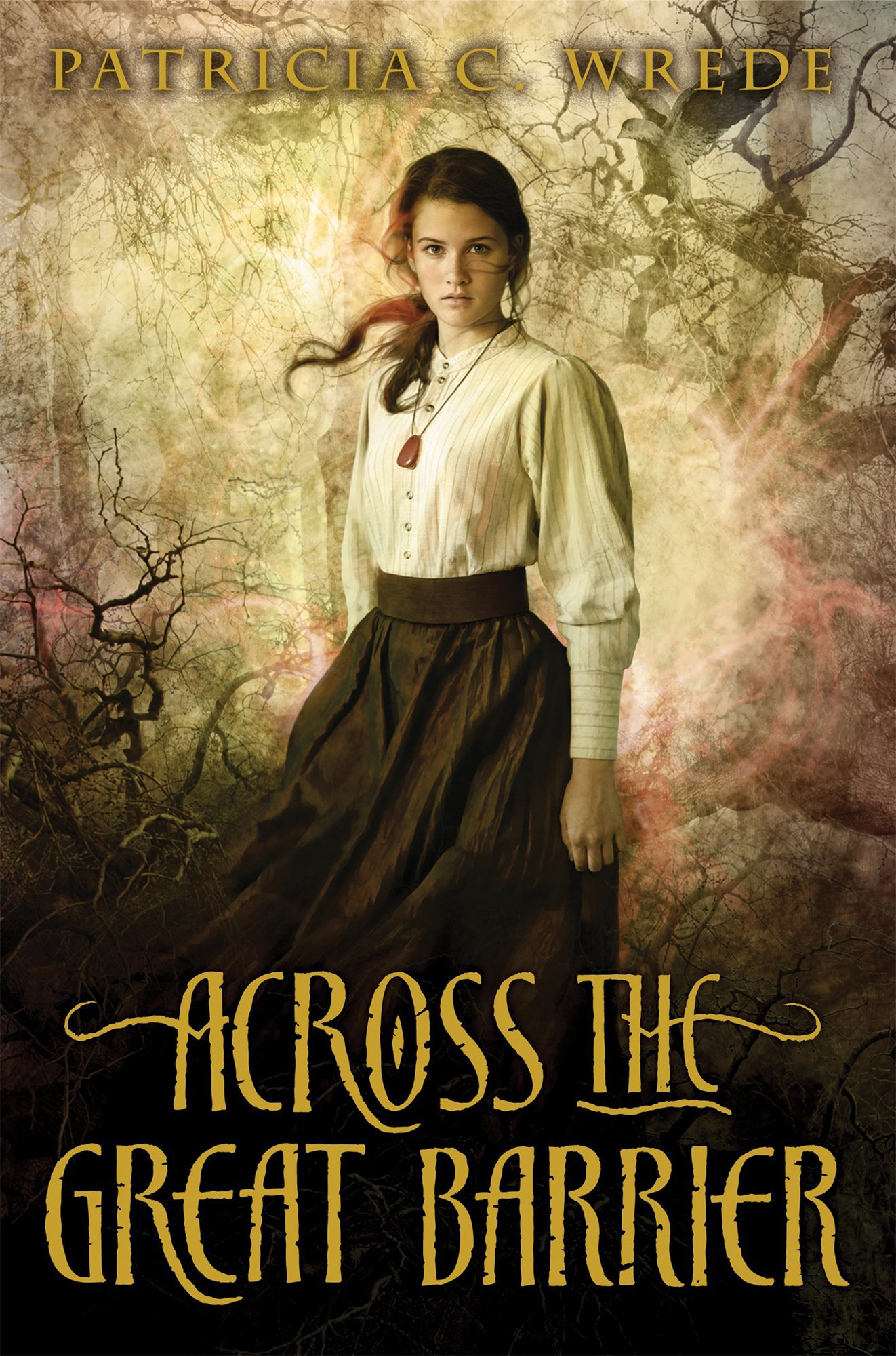 The sequel to Thirteenth Child, Across the Great Barrier continues the story of Eff Rothmer. Her twin brother is a seventh son of a seventh son, and a strong magician, but Eff–the old of the two–is the thirteenth child, and she grew up believing she was fated to be unlucky (a belief that was helped along by some of her extended family).
The sequel to Thirteenth Child, Across the Great Barrier continues the story of Eff Rothmer. Her twin brother is a seventh son of a seventh son, and a strong magician, but Eff–the old of the two–is the thirteenth child, and she grew up believing she was fated to be unlucky (a belief that was helped along by some of her extended family).
Eff Rothmer has returned to Mill City, and much to her chagrin, people are calling her a hero, for the work she did in coming up with a way to destroy the mirror bug infestation.
BEING A HEROINE IS NOWHERE NEAR THE FUN FOLKS MAKE IT OUT TO be. Oh, it's nice enough at first, when everybody is offering congratulations and making a fuss, but that doesn't last long. And when the thing they're congratulating you for is getting rid of a bunch of bugs, which you didn't do all by your own self anyway, it feels pretty silly. Not to mention that it annoys the other people who ought to have come in for some of the credit.
One of the interesting things is seeing Lan be jealous of Eff. Lan was used to being the center of attention, what with being a double seventh son, and it was good for both him and Eff. Especially since Eff is still trying to deal with her fear of her own magic, assuming that she would do wrong or evil.
But this story finds Eff coming to terms with her magic, and slowly discovering her dream–to travel the West, beyond the Great Barrier, studying the wildlife in that untamed area.
Luckily for her, the events of the previous book have given her some leeway as to her future, and the ability to work at the College menagerie.
"I think we've been taking the wrong tack," Professor Jeffries said. "He doesn't need calming down; he needs exercise."
"Ride him North and feed him to an ice dragon," Professor Torgeson suggested. She had strong opinions about wildlife, most of them unfavorable.
"An ice dragon would eat the rider first," Professor Jeffries said absently.
Lan has gone East to study, as has William (the first friend Eff and Lan made when they moved West) so Eff is a bit at loose ends, especially as she still hasn't completely controlled her magic.
If the first book was Eff learning that she wasn't jinxed and unlucky, this book was about Eff learning to use her magic and become her own woman.
We also see Eff growing up and becoming an actual adult.
I could be happy with him, if I worked at it, and it wasn't like I had a lot of other suitors banging at our door.
But I wasn't sure I wanted to work at being happy with Roger. I didn't want to get married just because most of my sisters had.
As it's the title of the book, it's unsurprising that Eff goes across the Great Barrier into the West, where magical creatures remain a threat. Her expedition is with one of the professors, who wants to study the effect that the Mirror Bugs had upon the land.
I find myself fascinated by this alternate history, and how the existence of magic in the New World would have affected settlement. I also like how there are some parallels to our past, but others are significantly different (FREX, we have Franklin and Jefferson, but no Lincoln).
And of course there is Eff herself. Her understanding of her own magic is slow, but it is something she does herself, without help, which makes that understanding all the better when she achieves it.But what I loved best is that–as with the previous story–there is lots of science and natural history and the basics of good science.
"Gathering base data is just as important as making entirely new observations. More important, sometimes; you can't tell whether something's changed if you don't know what it was like to begin with."
It's a lovely series, and I enjoyed it much this time around as I did before.
This is an absolutely lovely trilogy, and I already purchased the third (and I believe final) book to read.
Cover by Juliana Kolesova
Published by Scholastic Press
- Rating: 8.5/10
- March 2016 | Rating: 8.5/10
- November 2017 | Rating: 8.5/10
The Far West (2012)
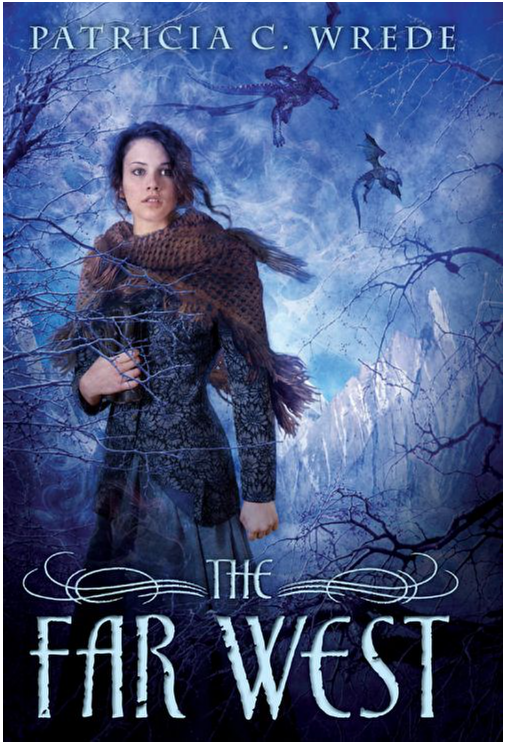 This is the conclusion to the Frontier Magic Series, that started with Thirteenth Child.
This is the conclusion to the Frontier Magic Series, that started with Thirteenth Child.
The final book finds Eff grown up, but still unsure what to do with herself, even though she has come to terms with being a thirteenth child.
Sometimes I couldn't help thinking that the unluckiest thing about being a thirteenth child was having all those older brothers and sisters telling me what to do.
She remains fascinated with the Far West, and wants to travel there more, but the dangers and the fears of her family make her unsure what she wants to do. But her friend William's return helps, as he never saw her birth order as a liability.
"We'll have to get together this week, so you can tell us all about it," William said to me. "Letters just aren't the same."
"Your letters certainly aren't," I said, sticking my nose up in the air and pretending to be cross. "I sent you pages and pages about the trip Professor Torgeson and I took through the settlements last year, and I was lucky to get three sentences back."
"They were very good sentences, though," William said earnestly.
Although Eff is grown in this book, it is still a YA, so even if there is falling in love and talk or marriage, it remains acceptable for even younger teens.
I didn't want to hurt Roger, but I had to admit that not wanting to hurt him was a terrible reason to marry a man.
Although the focus remains upon Eff, I still like Professor Torgeson.
"This one is Stheno, and that's Euryale."
"I suppose there's a certain symmetry in naming them after the three Gorgons," Professor Torgeson said. "I presume the third one is Medusa?"
Professor Jeffries shook his head. "A medusa lizard named Medusa would be confusing, and in any case, the third one is male. So I'm calling him Fred."
"Stheno, Euryale, and Fred."
Professor Torgeson sighed.
This is the book where Eff finally comes into her own. She is still learning to control her own magic, but because she is doing it on her own, and because she has learned the basics of different magical systems, she develops her own, unique view of how magic works and how she can manage it.
This was a wonderful conclusion to a very good series.
I liked very much how many of the elements are understated–as they would have been during that time, although the position of blacks and women in this parallel history is better than the position they held in real history. But this was a reasonable change, given the circumstances of the book.
One thing to be aware of–although there are elements of action, this isn't a non-stop adventure book. It's Eff's story, so things develop slowly, at her pace. So if you go into this looking for non-stop action, you're going to be disappointed. The story unfolds at Eff's pace, and is well worth your patience.
There is one thing that bothered me about this book, however. On the expedition they follow the river, and at one point they discuss traveling away from the river.
Here's the thing, even if this is the Great Plains, wouldn't there still be trees and rocky ground and other landscape features that make traveling with *wagons* very difficult to do? Don't expeditions normally travel on horseback or in boats?
I could well be wrong, but… it bugged me.
Mind you, that didn't take away from my enjoyment of the story, because it's not like the traveling was easy. But I do wonder.
But it is definitely a very good series, and I highly recommend it.
Cover by Juliana Kolesova
Published by Scholastic Press
- November 2012 | Rating: 8.5/10
- April 2016 | Rating: 8.5/10
- November 2017 | Rating: 9/10
Black Thorn, White Rose: A Modern Book of Adult Fairytales (1994) edited by Ellen Datlow & Terri Windling
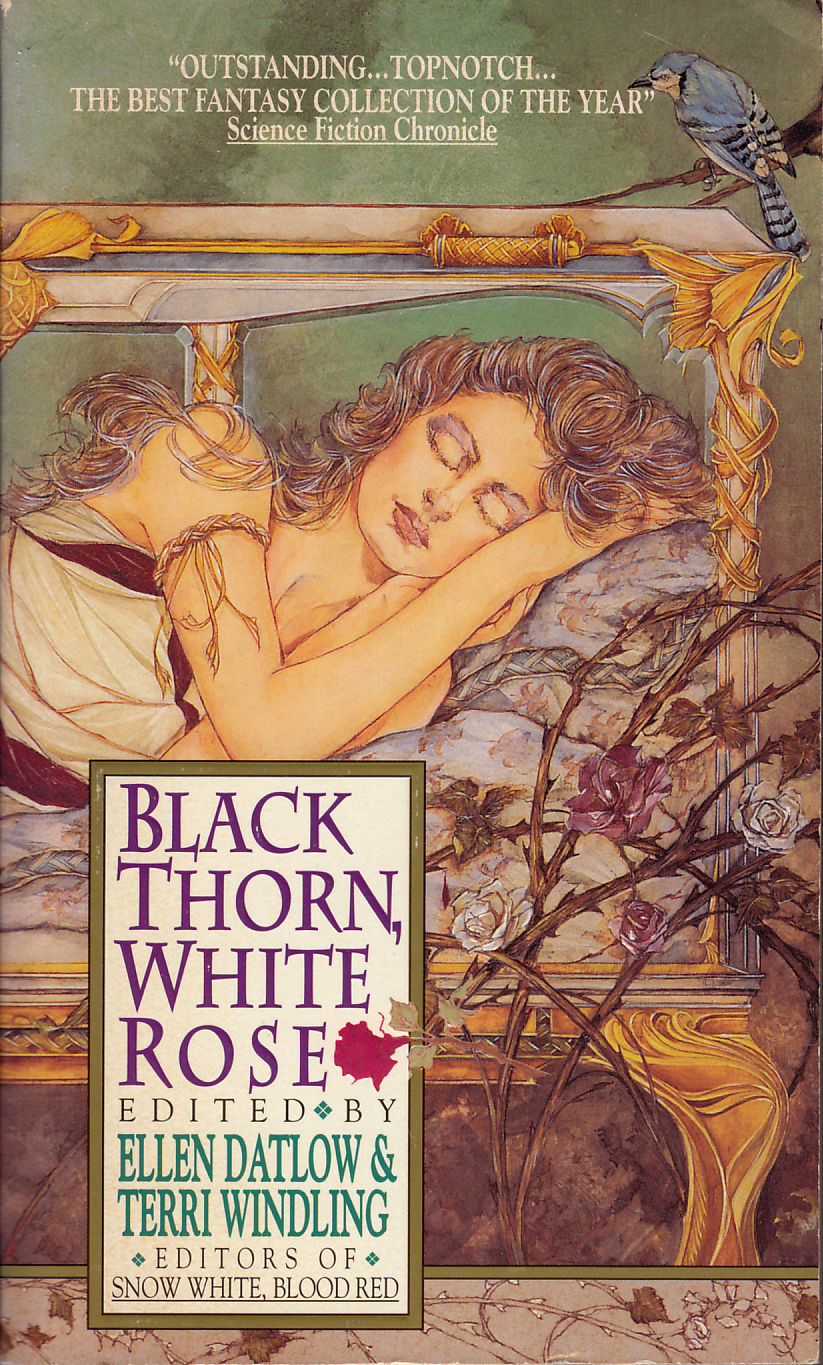 There were several of these collections in the 90s–and I had the first two if I remember correctly.
There were several of these collections in the 90s–and I had the first two if I remember correctly.
These are fairy tales retold–some with a change in the point of view, some retold in a modern setting, and some hewing only rather loosely the tales upon which they were based.
- Words Like Pale Stones by Nancy Kress
- Stronger than Time by Patricia C. Wrede
- Somnus's Fair Maid by Ann Elizaneth Downer
- The Frog King, or Iron Henry by Daniel Quinn
- NearbyBeauty by M.E. Beckett
- Ogre by Michael Kandel
- Can't Catch Me by Michael Cadnum
- Journeybread Recipe by Lawrence Schimel
- The Brown Bear of Norway by Isabel Cole
- The Goose Girl by Tim Wynne-Jones
- Tattercoats by Midori Snyder
- Granny Rumple by Jane Yolen
- The Sawing Boys by Howard Waldorp
- Godson by Roger Zelazny
- Ashputtle by Peter Straub
- Silver and Gold by Ellen Steiber
- Sweet Bruising Skin by Storm Constantine
- The Black Swan by Susan Wade
Please note that these are adult fairy tales. They are in the most part true to the original tales, but most adults would find those inappropriate for children.
Published by Wildside Press
Rating: 7/10
